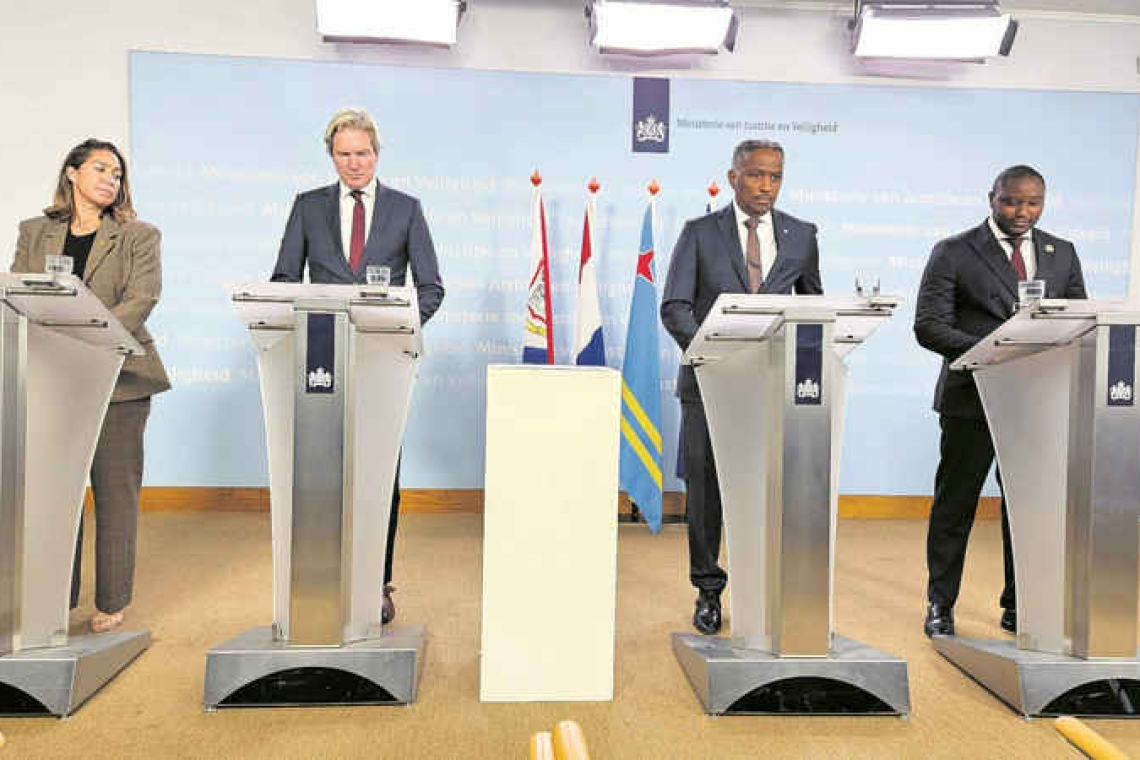The four ministers
THE HAGUE--The four Ministers of Justice of the Kingdom of the Netherlands have made new agreements on support during detention and cooperation in forensic care. “It’s reassuring to know that you can rely on the other countries when you can’t manage it yourself,” said Aruba’s Minister of Justice Arthur Dowers, chair of this Judicial Four-Country Consultation JVO.
Curaçao and the Netherlands will collaborate on the further training of people working in detention, but specifically also institutions like the Capriles Clinic. “We have reached an agreement on training for professionals who work with forensic patients and detainees. It is a valuable project for the islands,” said Curaçao’s Minister of Justice Shalten Hato. The Netherlands is offering financial support, but the amounts have not yet been announced.
St. Maarten and Aruba discussed support for detention, one of the biggest challenges St. Maarten currently faces. “If necessary, we can send staff from our services to provide support,” said Dowers.
“Thanks to our colleagues from Aruba, who have offered assistance,” said St. Maarten’s Minister of Justice Nathalie Tackling. Tackling hopes St. Maarten can assist other countries in the same way once the new prison is built in 2028.
The biannual JVO focuses on cooperation on challenges in the Caribbean and the European part of the Kingdom. Key themes include subversive crime, staff shortages and the increase in violence, including firearms.
Other themes include migration, the exchange and protection of personal data, and improved representation of Caribbean Dutch citizens in justice organisations such as the Prosecutor’s Office and the High Court.
The countries are working together to find and retain sufficient staff, and organised a job fair, among other things. Hato mentioned agreements not to cut back on justice personnel during reforms.
Unfortunately, Aruba has made staff cuts following the coronavirus pandemic as part of agreements with the Netherlands, said Dowers. The prison is also facing staff shortages due to longer prison sentences. Electronic detention and alternative punishments should alleviate this.
Dutch caretaker Minister Foort van Oosten, who took over Justice and Security just six days earlier, said the Netherlands also faces a staff shortage. “I recognise the problems in other countries. You can’t solve that overnight. There are too many vacancies and too few people. But during the JVO we also met online with people who are training to become prosecutors on the islands,” he added.
The topic of subversive crime requires a more in-depth discussion, the ministers said. The theme will be discussed at a strategic session in St. Maarten in January during the next JVO. “We’re going to look at what exactly ‘subversive’ means for the different countries,” said Tackling.
The countries also want to share experiences on one of their biggest concerns: increased gun possession and violence. “This also undermines the rule of law. In the coming period, we will be focusing on how these firearms enter our country,” added Tackling.
Finally, the JVO was also used to formally terminate the guardianship arrangement. Under this arrangement, when children moved from the islands to the European Netherlands, they were assigned a Dutch guardian, regardless of whether child protection services were involved. This arrangement is outdated. Therefore, the four ministers signed a decree to terminate such.
All in all, the ministers reflected positively on this JVO. “I note that the willingness to cooperate in the field of justice has intensified. It is not a Kingdom matter, but there is intensive cooperation within the Kingdom in this area. I also see a growing interest among the Dutch partners in gaining more insight and knowledge about the islands. I see more understanding,” concluded Dowers.







